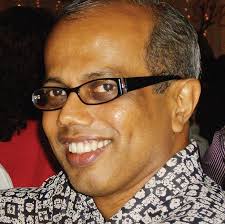Easter and the paradox of New Life
Easter is about new life, the resurrection of Jesus.
Apr 16, 2014

By Anil Netto
Easter is about new life, the resurrection of Jesus. That is what we are celebrating this weekend after the agony of Jesus’ suffering and death. But what is this new life about, and how does it affect us today, in this life, in this world?
Is it just about us and personal salvation? Or is Easter and new life only about the next world, the afterlife?
There is something more to the Resurrection than just individual salvation in the next life. If Jesus broke the captivity of the tomb and burst forth into new life, then what about all the problems in the world that chain us in frustration, the oppression that results in despair and the evil that grips humanity in a stranglehold? And how is the Resurrection related to the Kingdom of God?
In Romans, Chapter 8, we see that there is something bigger than us at stake; it involves the entire Creation.
20 It was not for its own purposes that creation had frustration imposed on it, but for the purposes of him who imposed it.
21 With the intention that the whole creation itself might be freed from its slavery to corruption and brought into the same glorious freedom as the children of God.
22 We are well aware that the whole creation, until this time, has been groaning in labour pains.
23 And not only that: we too, who have the first fruits of the Spirit, even we are groaning inside ourselves, waiting with eagerness for our bodies to be set free.
Freed from slavery to corruption. But there is also a harvest to be reaped. Just as Jesus’ death left behind unfinished work for his followers, his resurrection provided the impetus, the divine spark to fire the enthusiasm and inspire his followers to persevere in the work.
In recent times, we witnessed the example of the late Archbishop of El Salvador, Oscar Romero, who spoke out vocally against right- wing death squads who were targeting peasant leaders and activists in El Salvador, then governed by a US-backed military regime.
Romero himself was assassinated by a marksman while celebrating Mass in 1980. The readings for the day included John: Chapter 12 in which Jesus said, 24 In all truth I tell you, unless a wheat grain falls into the earth and dies, it remains only a single grain; but if it dies it yields a rich harvest. 25 Anyone who loves his life loses it; anyone who hates his life in this world will keep it for eternal life. 26 Whoever serves me, must follow me, and my servant will be with me wherever I am. If anyone serves me, my Father will honour him.
This paradoxically is what New Life is about: losing one’s life to produce the harvest. Indeed, after Romero’s own tragic death, one by one the nations in Latin America rose up to try and shake off the yoke of external economic domination to assert a more independent, autonomous path. So what kind of harvest are we talking about? It is nothing less than the transformation of the world.
The key Vatican II document Pastoral Constitution on the Church in the Modern World (Gaudium et Spes) tells us that the Kingdom of God is already present in this world as a mystery and it will be brought into full flower when the Lord returns:
“We do not know the time for the consummation of the earth and of humanity, nor do we know how all things will be transformed. As deformed by sin, the shape of this world will pass away; but we are taught that God is preparing a new dwelling place and a new earth where justice will abide, and whose blessedness will answer and surpass all the longings for peace which spring up in the human heart.”
In the meantime, we cannot relax and shake our legs! We are called to serve and to nurture this Earth, to oppose evil, injustice and greed: “Therefore, while we are warned that it profits a man nothing if he gain the whole world and lose himself, the expectation of a new earth must not weaken but rather stimulate our concern for cultivating this one. For here grows the body of a new human family, a body which even now is able to give some kind of foreshadowing of the new age.”
Jesus will take the earth we have nurtured and transform it into something beautiful in the fullness of time: “For after we have obeyed the Lord, and in His Spirit nurtured on earth the values of human dignity, brotherhood and freedom, and indeed all the good fruits of our nature and enterprise, we will find them again, but freed of stain, burnished and transfigured, when Christ hands over to the Father a kingdom eternal and universal, a kingdom of truth and life, of holiness and grace, of justice, love and peace.
So it is in this wider context that we should look at the Resurrection. Jesus overcame the forces of death, but the work of transforming the earth is cut out for us so that the Kingdom of God already within us can grow and flourish. We need to nurture the earth and rid it of corruption, injustice, violence, selfishness, greed so that it will be transformed and transfigured in the fullness of time.







Total Comments:0